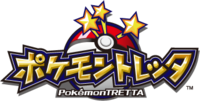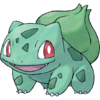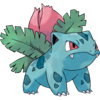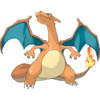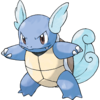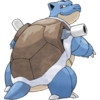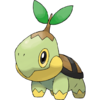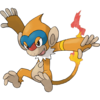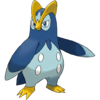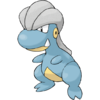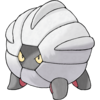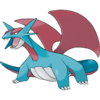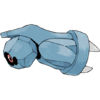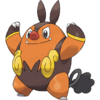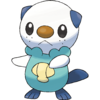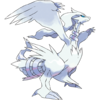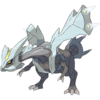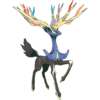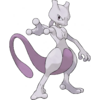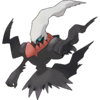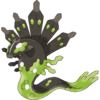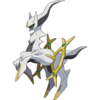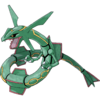Pokémon Tretta
| Pokémon Tretta ポケモントレッタ | |
|---|---|
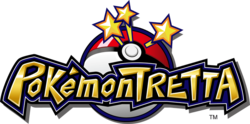 Logo of Pokémon Tretta | |
Basic info
| |
| Platform: | Arcade |
| Category: | Battle simulation |
| Players: | 1-2 |
| Connectivity: | None |
| Developer: | Takara Tomy A.R.T.S./ Marvelous AQL |
| Publisher: | Takara Tomy A.R.T.S.[1] |
| Part of: | Generation V and VI miscellaneous |
Ratings
| |
| CERO: | A |
| ESRB: | N/A |
| ACB: | N/A |
| OFLC: | N/A |
| PEGI: | N/A |
| GRAC: | N/A |
| GSRR: | N/A |
Release dates
| |
| Japan: | July 14, 2012 |
| North America: | N/A |
| Australia: | N/A |
| Europe: | N/A |
| South Korea: | N/A |
| Hong Kong: | 2017 |
| Taiwan: | April 16, 2016 |
Websites
| |
| Japanese: | Official website |
| English: | Official website |
|
Japanese boxart
| |
Pokémon Tretta (Japanese: ポケモントレッタ Pokémon Tretta) is an arcade game developed by Takara Tomy A.R.T.S. and Marvelous AQL, which also developed the Pokémon Battrio arcade game. Officially announced on April 18, 2012, Pokémon Tretta was rolled out nationwide in Japan in early July, phasing out the majority of retired Battrio machines. The arcade machines became fully operational on July 14, 2012 with the release of the first set. The machines were also available in Taiwan in Traditional Chinese and in the Philippines, Indonesia, Malaysia, Singapore, Thailand, and Hong Kong in English until their discontinuation in 2023.
Like its predecessor, Pokémon Tretta focuses on three-on-three Pokémon battles that require special tiles, called Tretta, that depict one of the various Pokémon species in order to play. Unlike Battrio however, Tretta incorporates searching and capturing Pokémon in various locations. Pokémon caught in-game are dispensed for players to use in other battles, or to add to their collection.
Each Pokémon Tretta machine costs ¥100 to operate. The console itself can be divided into two sections:
- The upper section contains the main screen where the core gameplay is displayed. Directly below this in the center is a large Poké Ball button used when capturing Pokémon. Either side of the Poké Ball button are two small circular screens: the left screen displays time in various game modes, the right displays a bonus Poké Ball progress gauge. On the bottom of the upper section is a dial, which can be rotated clockwise or counterclockwise to cycle between game modes, searchable areas and between Pokémon while in battle. The semicircular screen above this acts as an additional visual aid for certain cycles, and also displays a damage bonus roulette during battle.
- The lower section contains two buttons on the left and right, which are used to confirm commands. The right side has an IC card scanner used to read Tretta Reports, while the left contains space to keep spare Tretta tiles. The green pad in the center is where Tretta tiles are placed into each of the three niches during battle.
Release history
Over its release history, Pokémon Tretta has gone though a number of series, which often include additional affixes to denote its change. Each series has a number of associated sets and the firmware is often upgraded to incorporate new mechanics and cosmetic changes to the interface, with the current version of the system displayed on the start screen. The design of the artwork featured on Tretta, as well as physical changes to the Tretta themselves, sometimes occurs between series.
| Tretta series and sets | ||||||||||||||||||
|---|---|---|---|---|---|---|---|---|---|---|---|---|---|---|---|---|---|---|
| ||||||||||||||||||
| ||||||||||||||||||
| ||||||||||||||||||
Tretta
Tretta are rounded square plastic tiles measuring 41×41×3.6 mm and are integral to the gameplay of Pokémon Tretta, as at least one is required to play the game. Each Tretta portrays one of the Pokémon species along with a set of individual statistics such as Hit Points, Attack, Defense, and Speed. Each Pokémon also has a set type attributed to it and up to three possible moves as featured in the core series of Pokémon games. Tretta also display the collection number, name, and portion of an image on the left edge. When put in set order, the edges form an image of a number of Pokémon.
Statistics
A Pokémon's stats are detailed on the reverse of Tretta. HP determines how much damage a Pokémon can sustain before it can no longer partake in battle. Attack, identified in red, determines how powerful moves used by the Pokémon are. Defense, identified in blue, determines how susceptible Pokémon are to damage. Speed, identified in green, determines the order in which Pokémon battling each other will attack or how easily they may dodge an incoming attack. Energy (Japanese: ポケエネ PokéEne) is detailed on the obverse and gives a rough indication as to the overall strength of the Pokémon, much like levels in other Pokémon games.
Types and moves
| Tretta Types | |||
|---|---|---|---|
Normal |
Fire |
Water | |
Grass |
Electric |
Ice | |
Fighting |
Poison |
Ground | |
Flying |
Psychic |
Bug | |
Rock |
Ghost |
Dragon | |
Dark |
Steel |
Fairy | |
A Pokémon's type is indicated by a symbol on the obverse of the Tretta. Its type determines what move types it will be weak against or resistant to in battle. The types featured in Pokémon Tretta are the same as those found in the core series, and share their individual strengths and weaknesses. The first set did not feature all types, but all as at Generation V were covered by the time of the fifth set. The Fairy type was introduced in the ninth set, shortly after the start of Generation VI. With the exception of the Fairy type, all symbols used in Pokémon Tretta are based on those from Pokémon Battrio.
Each Pokémon can have up to three moves as indicated by the segments on the reverse of the Tretta. Each segment details the name and type of the move, all of which are based on those from the core games. Each Pokémon in the first set only had one move, but sets released thereafter included Pokémon with multiple moves.
Rarity
Pokémon in Pokémon Tretta are divided into classes, as indicated by graphics on the front and reverse of Tretta tiles. Normal-class Tretta are identified by one star, Super-class by two, Hyper-class by three, and Master-class by four. Legend-class and Ultimate-class Tretta do not feature stars, but have appropriately named emblems on both sides. More powerful Pokémon have a higher-class rating, and therefore have a higher rarity. Rarer Tretta also have additional aesthetic enhancements, with Hyper-class and above Tretta featuring a Holofoil front. Master-class Tretta are also lamé-treated and transparent. The tile color of standard Tretta often change between sets, though specific classes and most promotional Tretta generally retain specific colors. The table below summarizes the colors and rarities in Pokémon Tretta.
Gameplay
Starting a game
Upon inserting ¥100, players can choose between two primary game modes: Battle and Catch (Japanese: ゲームでゲット Get In-Game) and Quick Catch (Japanese: いますぐゲット Get Now). Battle and Catch allows players to play the game in its entirety, while Quick Catch enters a short sequence in which a Quick Ball is thrown to catch and dispense a random Pokémon. Other modes have been added over the system's lifespan, including Pair Battle and Catch (Japanese: ふたりでゲット Get in Pair), which added two-player features to gameplay; Extra Campaign (Japanese: エクストラキャンペーン), which allowed players to capture a powerful Legend-class Pokémon to use as a partner; and Challenge Battle (Japanese: うでだめし Test Your Skill), which pitted players against a difficult team of Pokémon. Two practice modes, Energy Contest Simulator (Japanese: おためし! ポケエネカップ Trial! PokéEne Cup) and Battle Contest Simulator (Japanese: おためし! バトルスコアカップ Trial! Battle Score Cup), were also made available to players for short periods of time, allowing them to practice for upcoming competitions. The dial on the upper section is used to cycle between game modes.
Search Mode
Upon starting a full game, Search Mode (Japanese: サーチモード) will begin in an area of the game map, which comprises several different environments. The player is then presented with six individual locations to look for Pokémon in, three of which can be selected at once by rotating the dial on the upper section of the console. Pokémon can only be found in certain locations, so it is up to players to determine which Pokémon may reside in a certain location before they consider including it within their search radius. Some locations may have the silhouette of a Pokémon that will be encountered if selected.
Once the player has chosen their search radius, pressing one of the two buttons on the lower section of the console will confirm the selection. The Pokémon in each of the locations are then revealed. If any high-class Pokémon are encountered, these are notified with a warning message. Search Mode was slightly expanded from Experience Mega Evolution! to Invasion! Mega Rayquaza, in which each selected location was explored individually. After zooming in to each location, an area within would shake, prompting the player to press a button and reveal the hidden Pokémon. From Search! Strongest Friends, two Pokémon could be encountered at a location.
Locations featured in Pokémon Tretta vary depending on the latest set, and are detailed below. The Pokémon available to capture are limited to the latest set.
| Set | Tretta locations | ||||||||
|---|---|---|---|---|---|---|---|---|---|
| Forest しんりん |
Waterfront みずべ |
Cave どうくつ |
Field こうげん |
Ruins いせき |
Beach かいがん |
Mine こうざん |
Park こうえん |
Foot ふもと | |
| Pokémon Tretta League Opening! Theme: Summer |

|

|

|

|

|
||||
| Search for the Legendary Pokémon! Theme: Autumn |

|

|

|

|

|
||||
| Black Kyurem & White Kyurem Theme: Winter |

|

|

|

|

|
||||
| Witness Genesect! Theme: Spring |

|

|

|

|

|
||||
| Search with Meowth! That Trio!! Theme: Rainy Season |

|

|

|

|

|
||||
| Gather! New Leaguers Theme: Festival |

|

|

|

|

|
||||
| Let's Go Everyone! Let's Catch It! Theme: Festival (Autumn) |

|

|

|

|

|
||||
| Have You Seen Them?! The New Powers!! Theme: Festival (Winter) |

|

|

|

|

|
||||
| Chespin! Fennekin! Froakie! Theme: Beginning Island |

|

|

|

|

|
||||
| Experience Mega Evolution! Theme: Wonder Park |

|

|

|

|

|
||||
| Xerneas & Yveltal Theme: Shiny Village |

|

|

|

|

|

|
|||
| Search! Strongest Friends Theme: Thriller Hills |

|

|

|

|

|

|
|||
| Primal Reversion's Super Power! Theme: Beyond Land |

|

|

|

|

|

|
|||
| Invasion! Mega Rayquaza Theme: Gogo Field |

|

|

|

|

|

|
|||
| Dragon Ascent! Black Mega Rayquaza Flight Theme: Spring |

|

|

|

|

|

| |||
| Glaciate! Kyurem Assault Theme: Summer |

|

|

|

|

| ||||
| Judgment! Arceus Advent Theme: Summer |

|

|

|

|

|

| |||
| Hyperspace Fury! Hoopa Transformation Theme: Autumn |

|

|

|

|

|

|
|||
Battle Mode
Upon starting Battle Mode (Japanese: バトルモード), the player can then place up to three Tretta in each of the niches on the green scanning area. If the player does not have three Tretta, rental Pokémon will be used to make the deficit. If the player has any special Pokémon Battrio 'bridge pucks' featured in the Legendary & Mirage Shining Victory expansion, they can also be placed face down and used in place of a Tretta. The player has 30 seconds to select their Pokémon and confirm their choice by pressing one of the two buttons or the Poké Ball button in the center of the console.
The player's three Pokémon then go up against the three encountered in Search Mode in a three round battle. At the start of each round players can cycle between their Pokémon by using the dial on the upper section of the console, with each one displaying its type matchup against the three opponent Pokémon. The player has 19 seconds to confirm their choice. The faster a Pokémon is selected, the better the Poké Ball bonus a player will receive as indicated by the circular screen on the right side of the console. Bonus Poké Balls earned in this way are stacked on the right side of the main screen.
From the Search for the Legendary Pokémon! set onwards, Pokémon may have more than one move. Pokémon that do will have additional options displayed on the semicircular screen above the dial for each move, essentially acting as an additional party member. Pokémon with multiple moves may also attack again if member(s) of their party are unable to battle.
Between the selected Pokémon and the three opponent Pokémon, the one with the highest Speed stat will attack first. When it is the turn of the player's selected Pokémon, an Attack Bonus Roulette (Japanese: アタックボーナスルーレット) will appear on the semicircular screen on the bottom of the upper section. The player has 8 seconds to stop the roulette by pressing one of the two buttons. Possible attack bonuses range from +5 to +50, depending on the class of Tretta. Ultimate-class Tretta, introduced in Dragon Ascent! Black Mega Rayquaza Flight, have a slightly different bonus called the Attack Bonus Slot (Japanese: アタックボーナススロット), which presents the player with two reels. The left reel includes plus and minus signs, and the right reel includes values ranging from 5 to 50. This effect is further enhanced when Zygarde (Z2-XX) or Zygarde (Ultimate Z Challenge) are used to attack, where the right reel would include values ranging from 5 to 100 instead. Both reels also feature a different layout than of the normal Attack Bonus Slot. Pressing the left and right buttons stop the respective reels. The value ultimately selected in either bonus is added to or deducted from the Pokémon's base attack for the current round.
The selected Pokémon then executes its attack against all three opponent Pokémon. The damage dealt to each is the difference between the base attack of the selected party Pokémon (plus/minus any attack bonuses or type advantages/disadvantages) and the base defense of the opposing Pokémon. When attacking and defending, the game will also prompt the player to press the two buttons on the lower section as quickly as possible to increase the likelihood of a small attack bonus or evading the attack, respectively. If Pair Battle and Catch mode was in use, one player was prompted to press the two buttons, while the other could spin the dial.
Each party Pokémon has an HP bar. The opponent Pokémon have a similar HP gauge in the form of the Catch Gauge on the top of the screen. The Catch Gauge is filled each time the opponent Pokémon take damage. Completely filling the Catch Gauge of any of the opponent Pokémon will make them unable to battle, and thus easier to catch—a state called Catch Chance (Japanese: ゲットチャンス Get Chance) in-game. Conversely, if the HP bar of any party Pokémon is completely drained, they will be unable to battle. Battle Mode concludes after three rounds, unless the player runs out of usable Pokémon. Surviving party Pokémon at the end of the three rounds will each earn one additional bonus Poké Ball. The remaining HP determines the strength of the Poké Ball awarded, with higher remaining HP values earning better Poké Balls.
New features are often added with the start of a new series or with the release of new sets that change the Battle Mode experience, and encourage players to invest with newly-released Tretta.
Catch Mode

Catch Mode (Japanese: ゲットモード Get Mode) begins with a large roulette wheel consisting of sixteen spaces, fifteen of which contain standard Poké Balls and one containing a Master Ball. Any bonus Poké Balls earned during Battle Mode randomly take the place of standard Poké Balls on the wheel. Players with Tretta Reports also gain an additional bonus Poké Ball, the strength of which depends on the player's rank as indicated by the color of their Tretta Report icon after a completed game. The wheel then spins and the player has 10 seconds to press the large Poké Ball button in the center of the console. If Pair Battle and Catch mode was in use, one player could spin the dial to increase the chance of improving the type of ball ultimately selected, indicated by the gauge on the screen above the dial. The selected Poké Ball is then used on all three opponent Pokémon in attempt to catch them. The chances of a successful capture depend on the class of the opponent Pokémon, its remaining HP, and the type of ball thrown in a similar manner to the core games.
If a Pokémon is successfully captured, the correlating Pokémon will be dispensed from the machine as a Tretta tile. If more than one Pokémon is captured, the player can choose which Tretta to obtain. The player can also obtain any other Tretta by inserting a further ¥100 for each captured Pokémon, or choose to end the game.
Weekly Bonus
The Gather! New Leaguers set adds the Weekly Bonus (Japanese: ウィークリーボーナス) feature, which provides a helpful boost in one of the three modes during gameplay for one week, before providing another the following week. Search Bonus (Japanese: サーチボーナス) adds an additional Pokémon silhouette during Search Mode. Battle Bonus (Japanese: バトルボーナス) increases the range on the bonus damage roulette for Normal-class, Super-class, and Hyper-class Tretta to the same as the class above them during Battle Mode. Master-class and Legend-class Tretta are not eligible for the Battle Bonus. Catch Bonus (Japanese: ゲットボーナス Get Bonus) adds an additional Ultra Ball on the Poké Ball roulette during Catch Mode. From the Let's Go Everyone! Let's Catch It! set onwards, the Catch Bonus instead adds a Master Ball.
X Power and Y Power
Have You Seen Them?! The New Powers!! added the X Power (Japanese: Xパワー) and Y Power (Japanese: Yパワー) features, which allowed players to utilize the special abilities of Legendary Pokémon Xerneas and Yveltal, respectively. Present on the start screen were two gauges, the blue X Power Gauge on the left, and the red Y Power Gauge on the right. These two gauges accumulated over time while the machine was in use, and once a gauge had been filled, the player using the machine at that time was be able to use a power during any round in Battle Mode. X Power activated when the HP of at least one of the players' party Pokémon was zero, in which Xerneas was summoned to restore up to half of the HP of the affected Pokémon. Y Power could be activated during a battle, in which Yveltal was summoned to increase the possible damage bonuses on the Attack Bonus Roulette.
Players with a copy of Pokémon X or Pokémon Y could also connect to special Tretta machines that were able to communicate with their Nintendo 3DS via "ConnecTretta". While a connection was maintained during Tretta gameplay, the X Power Gauge or Y Power Gauge would accumulate faster depending on the corresponding game. Connected players could also see Hall of Fame entries of other connected players. When not in use, "ConnecTretta" machines could also show a game in progress of another connected player from a different machine. The X Power and Y Power mechanic was discontinued with the release of the Xerneas & Yveltal set.
Mega Evolution
Starting with the Experience Mega Evolution! set, Tretta come in two designs: one featuring a Poké Ball, and one featuring a Mega Evolution symbol. Tretta with the Mega Evolution symbol indicate that the Pokémon depicted on it are able to Mega Evolve. In Experience Mega Evolution!, the Friend Gauge (Japanese: なかまゲージ) present around the HP of the player's party would increase as Pokémon took damage, and once this reached MAX, players were given one of two options: either Mega Evolve an eligible Pokémon, or replace a fainted Pokémon by scanning in a fourth Tretta. The Friend Gauge and fourth Tretta mechanic were rejected in the following set, Search! Strongest Friends, in favor of Sudden Mega Evolution (Japanese: いきなりメガシンカ), in which eligible Pokémon can Mega Evolve from Round 1.
Mega Evolution can be achieved in two ways: either by using an in-game Key Stone "loaned" by the Pokémon Tretta League, or by using Pokémon Tretta Mega Evolution merchandise, including the Pokémon Mega Ring and Pokémon Mega Bangle. If the player owns either of the Mega Evolution products, they must scan the Key Stone on the green pad when prompted. If the player does not have these products, a roulette will spin for a chance to activate the in-game Key Stone. Mega Pokémon retain the type and attacks of the regular Pokémon depicted on the Tretta, but have increased stats. Mega Evolution Tretta from the Primal Reversion's Super Power! set feature a second Energy value to give an indication of the overall increase. As in the core series, only one Pokémon can Mega Evolve during Battle Mode, and will stay in its Mega Evolved state for the remainder of Battle Mode. If a Pokémon Mega Evolves, it also has access to all of its moves again, even if one was used in a prior round.
Tretta Reports
Tretta Reports (Japanese: トレッタレポート) function in a similar manner to Memory Keys in Pokémon Battrio. Sold at a retail price of ¥500, they are not necessary to play the game but add a personal element and supplementary features to it. Tretta Reports are IC cards, similar in size to credit cards, and have a limit as to how many times save data can be recorded on them. Current varieties of Tretta Reports have a range of between 100 and 400 saves. Once the maximum allocation of data saves has been reached, players can transfer the data to a new Tretta Report.
Tretta Reports allow players to select a male or female avatar, input a nickname, and an age in years. After each game the Tretta Report keeps track of and awards points for various accolades, broken down into three categories. Discovery Comp (Japanese: はっけんコンプ) records different Pokémon encountered in Battle Mode, including form differences. Pokémon Comp (Japanese: ポケモンコンプ) records any Pokémon caught in Catch Mode. Unlike Discovery Comp, class differences between Pokémon count as separate entries. Pokémon Tretta Comp (Japanese: ポケモントレッタコンプ) records the physical Tretta obtained via Catch Mode or used in Battle Mode, effectively acting as an in-game checklist for each set. Bonus points are also awarded for forming like chains, such as obtaining different forms of the same Pokémon. From Let's Go Everyone! Let's Catch It! onwards, a gauge is displayed for individual Pokémon in Pokémon Comp, which increases each time upon a successful capture. Capturing a number of the same Pokémon for one set will activate Friend Power (Japanese: なかまパワー), which increases the stats of Super, Hyper, and Master-class Tretta depicting that Pokémon in Battle Mode.
Points are kept track on Point Cards in-game, represented by stamps. Filling a Point Card with stamps earns the player a medal, and effectively an increase in rank. Moving to the next rank presents a new more challenging Point Card to complete and may upgrade the class of the Tretta Report itself, providing an additional bonus Poké Ball to go on the roulette in Catch Mode. Medals are also awarded for other actions, such as earning 1000 points in one session. After points have been awarded, players with smart phones can take an image of the supplied QR code and upload it via the Pokémon Tretta website to view National Rankings.
Partner Pokémon
Players with Tretta Reports can also choose a Partner Pokémon to assist them in Battle Mode. The available choices depend on the latest set. Each one starts as an Egg, and can be hatched by gaining points by playing the game, effectively acting as experience. Once hatched, players can utilize the special ability of their Partner Pokémon. Gaining experience will also evolve Partner Pokémon, increasing the effectiveness of their special ability and overall stats. If a player's Partner Pokémon reaches the final stage of evolution, it loses its special ability but can be summoned in Battle Mode as an Extra Attacker. At the end of the third round, the player will be prompted to press the Poké Ball button in the center of the console when the presented green line gets to the target point. The Partner Pokémon will then appear and deal additional damage to the opponent Pokémon. Prior to Chespin! Fennekin! Froakie!, every new set would force the player to start afresh with another Partner Pokémon limited to the initial pool of two or three. This was changed so that any Partner Pokémon that became an Extra Attacker over the course of the players' play history could be selected to support them, a feature previously reserved for Extra Campaign mode or events such as Challenge Cups. Any Pokémon caught through the Extra Campaign or Challenge Battle modes can also be selected as an Extra Attacker.
In other languages
| |||||||||||||||
See also
- Get! Pokémon Tretta!
- Go! Pokémon Tretta!
- The! Pokémon Tretta! with Pokémon Mega Ring
- Pokémon Tretta Ultimate!!
- Pokémon Tretta Ultimate Z!!!
- Pokémon Tretta Theme Song Medley
References
| Partner Pokémon | |||||||||||||||||||||||||||||||||||||||||||||||||||||||||||||||||||||||||||||||||||||||||||||||
|---|---|---|---|---|---|---|---|---|---|---|---|---|---|---|---|---|---|---|---|---|---|---|---|---|---|---|---|---|---|---|---|---|---|---|---|---|---|---|---|---|---|---|---|---|---|---|---|---|---|---|---|---|---|---|---|---|---|---|---|---|---|---|---|---|---|---|---|---|---|---|---|---|---|---|---|---|---|---|---|---|---|---|---|---|---|---|---|---|---|---|---|---|---|---|---|
| |||||||||||||||||||||||||||||||||||||||||||||||||||||||||||||||||||||||||||||||||||||||||||||||
| |||||||||||||||||||||||||||||||||||||||||||||||||||||||||||||||||||||||||||||||||||||||||||||||
| |||||||||||||||||||||||||||||||||||||||||||||||||||||||||||||||||||||||||||||||||||||||||||||||
| |||||||||||||||||||||||||||||||||||||||||||||||||||||||||||||||||||||||||||||||||||||||||||||||
| |||||||||||||||||||||||||||||||||||||||||||||||||||||||||||||||||||||||||||||||||||||||||||||||
| |||||||||||||||||||||||||||||||||||||||||||||||||||||||||||||||||||||||||||||||||||||||||||||||
| |||||||||||||||||||||||||||||||||||||||||||||||||||||||||||||||||||||||||||||||||||||||||||||||||||||||||||||

|
This article is part of Project Arcade, a Bulbapedia project that covers all aspects of Pokémon arcade games. |
